In this new post, Oriana Sánchez-Mahecha – a PhD student from the Technical University of Munich, Germany – presents her work “Microbe-induced plant resistance against insect pests depends on timing of inoculation but is consistent across climatic conditions”. Here, she discusses the importance of including extreme abiotic factors associated to climate change scenarios when studying bacteria-plant-insect interactions, shows how they might influence microbe-plant associations and their effects on further plant insect interactions, and explores her journey in ecology, starting from her time at her grandparent’s farm.
About the paper
Agriculture is one of the most dominant forms of land use. To increase yields, crops are often sprayed with pesticides and heavily fertilized, and these inputs tend to have negative effects on the environment and biodiversity. For this reason, it is important to investigate environmentally friendly alternatives to these inputs that can help push agriculture in a more sustainable direction. One interesting option is the use of beneficial microbes, which may boost plant growth while leading to microbe-induced resistance against insect pests. For such an interaction to be useful in agriculture, it is important to understand how it operates in a variety of conditions such as those found in agricultural fields, particularly under a changing climate.
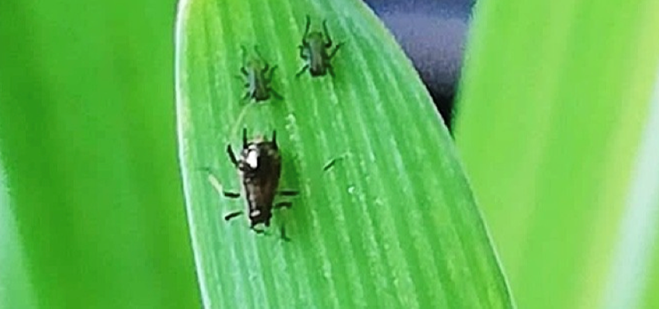
Here, we tested the effects that a single heatwave event and a gradient of plant water availability have on beneficial plant-insect interactions using a crop model system conformed with a soil bacteria (Acidovorax radicis N35e), the barley plant (Hordeum vulgare) and English grain aphids (Sitobion avenae). We also evaluated whether the timing of bacterial inoculation (before or after the temperature treatment) influenced bacteria-plant interactions on aphids to explore if bacterial re-inoculations could restore, maintain, or even enhance the microbial effect on the plant after the exposure to abiotic extreme factors. For that, we separated the experiment into bacterial inoculations before and after the temperature treatment, resulting in a cool and interesting study.
We found that the bacterium A. radicis induced plant resistance against aphids, reducing the aphid colony growth. Interestingly, this beneficial effect was consistent across heatwave and water availability treatments. We did not expect this, as we thought interactions would operate best at optimal growth conditions but would be disrupted under extreme conditions, in terms of watering (drought, wet) or temperatures (heatwave). Instead, the effects depended on the timing of inoculation, with a stronger resistance observed when bacteria were added to the plant at a time point closer to the aphid infestation. Regarding plant performance, the heatwaves and water availability shifted the biomass allocation from aboveground to belowground tissues. We suspect that the consistent suppressive effect of A. radicis across the abiotic factors was enabled by the fact that, even in the more extreme water availability treatments, plants were re-watered, albeit with very small volumes. This may have contributed to plant recovery, together with features of the bacteria such as biofilm formation, which was shown to be related to increased water retention and bacterial colonization in other beneficial bacterial species. In addition, both the bacteria and abiotic stress factors could modulate plant defenses that might lead to a response against insect herbivores. However, this needs to be explored in further studies with more extreme conditions.
Our study highlights that microbes represent a potential solution for sustainable agricultural practices by modulating plant growth and response to insect pests under changing environmental conditions. Moreover, this study shows that it is fundamental that more studies include factors that are present in natural conditions, to have a better understanding of how microbic-plant-insect interactions could be affected by these conditions. We need to have a better understanding of the beneficial microbial effect in natural settings, for example, by using full- factorial experiments that allow to explore the direct abiotic factors effect on the organism (i.e., microbe, plant, insect) but also the potential resultant effect through their interactions. Our research into microbe-plant insect interactions is ongoing, and we are interested in contributing to the knowledge of how beneficial interactions can be used to improve plant health and pest tolerance in sustainable agriculture by disentangling the mechanics behind microbe-plant insect interactions.
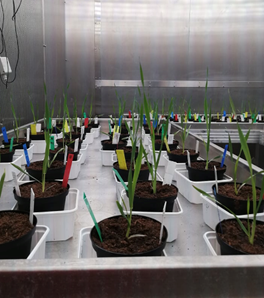
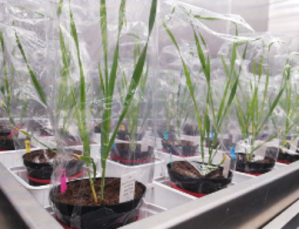
Experimental setup before (left) and after the heatwave and insect infestation (right) (Credit: Oriana Sanchez Mahecha)
About the research
At the beginning of my Ph.D., in January of 2019, I had the opportunity to participate in the annual meeting of COST Action FA1405 ‘Using three-way interactions between plants, microbes and arthropods to enhance crop protection’, which took place in Thessaloniki, Greece. This was a great and unique conference that brought together talented scientists from around the world. It was attended by many motivated Ph.D. students who presented their exciting findings and led inspiring discussions about plant ecological interactions. There, I accompanied my supervisor, Sharon Zytynska, and I was introduced to the amazing world of ecological interactions. This is also where I first met Robin Heinen, who, unbeknownst to us both at that time, would become a key part of my PhD. When I returned to Germany from Thessaloniki with big motivation and ideas, I started my research on the impact of beneficial bacteria on plant ecological interactions. During the first year and a half, I focused on investigating the impact of soil-inoculated bacteria modulating plant responses to sucking insects and explored how the bacterial effect was regulated by bacterial signaling molecules and affected by biotic and abiotic factors such as presence of other soil organisms (i.e., earthworms), soil nutrient conditions. In this project, I conducted multiple experiments in close collaboration with another Ph.D. student, Sophia Klink, and her supervisor Michael Rothballer, from the Institute of Network Biology from Helmholtz, Munich.
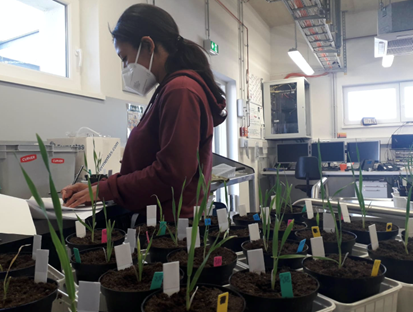
The first part of my Ph.D. was a bit challenging since my primary supervisor moved to another country where she accepted a professorship. This made us learn how to work remotely, even before COVID hit the world. This became a strength during COVID times, since we already had the experience of working together remotely. From fall 2019, Robin Heinen was employed in our research group, the Terrestrial Ecology Research Group, at the Technical University of Munich. This was amazing for my research since he had knowledge of the effects of soil microbes on plant-insect interactions. Working with Sharon and Robin brought fresh ideas to my research, such as investigating interacting abiotic factors that are more frequently observed because of climate changes like heatwaves and differences in water availability. Together, we designed an experiment where I could explore the single and combined effects of heatwaves and variation in water availability, since little was known about how both heatwaves and extremes in water availability impact the beneficial bacteria-plant interactions and the potential effect that they may leave on microbe-induce resistance to insect herbivores. Finally, all these ideas resulted in a full-factorial experiment that was conducted in 2021 in TUMmesa (Technical University of Munich model ecosystem analyzer).
About the author
Since I was a kid, I have been deeply in love with nature. I used to spend most of my time playing outside or on my grandparent’s farm in Ecuador, where I had the opportunity to enjoy a wonderful river and observe several types of plant and animals every day. Later, I discovered that my favorite subject was biology and I continued exploring the surrounding ecosystems. With time, this love and admiration for nature encouraged me to study biology at the Universidad del Tolima, located in Ibagué, Colombia, to have a better understanding of how ecosystems work, to learn about biodiversity, and also to learn how to protect nature. During my studies, the lectures that I enjoyed the most were focused on plants; therefore in my free time I decided to enjoy the group on plant tissue culture and genetics and work on in the city’s botanical garden at the weekend, where I learned and practiced identifying plant and animal species and the importance of their ecosystem services.
In Colombia, the country where I come from – a paradise of biodiversity – I used to work in the national parks as a volunteer during some of my holidays. I had the opportunity to see some of the most beautiful endemic species and started to think about the next step in my career. I decided to pursue a Master’s degree in Landscape Ecology and Nature Conservation at Greifswald University in Germany. This step was a bit challenging because I did it in another language, and in a totally different country. Yet, it was very satisfying to learn from top researchers in this new country. There, I conducted research on Myxomycetes supervised by Nikki Dagamac and continued my learning of molecular skills in the research group of General and Special Botany.
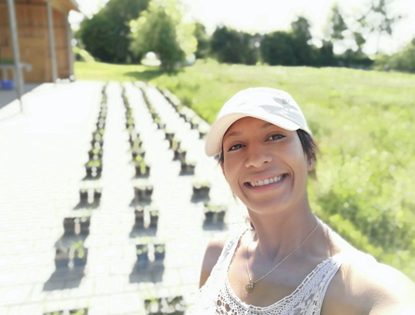
Currently, I am a PhD student at the Terrestrial Ecology group of the Technical University of Munich, where I have learned many skills. I enjoy working here a lot, because it gives me the opportunity to work with talented researchers interesting fields that are differed but connected. This brings good and fresh points of view to the group. Here, I am developing my research on plant- insect-interactions, contributing to the understanding of these interactions that I consider to be very important for the understanding and use of such microbes in sustainable agricultural practices.
Like the blog post? read the research here.
